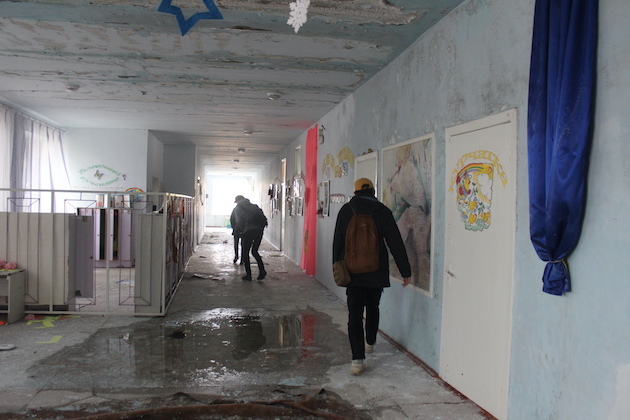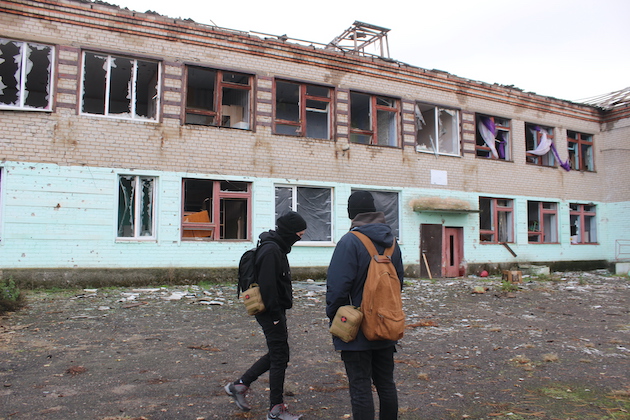Summary:
-
Investigators desire changes in the way war crimes are looked at and prosecuted.
-
Nychka Lishchynska is to blame.
-
A fundamental shift in how the world responds to war atrocities is required, say groups involved in documenting them, as plans to establish an international centre in The Hague to try war crimes committed in Ukraine are unveiled.
-
For example, satellite images or other data can help identify which soldiers were in a specific spot at a particular time when a war crime allegedly occurred, according to Ajvazovska. “
-
They are confident that these will eventually help bring even those at the highest levels of the Russian leadership to trial, along with a continued focus on the conflict on the part of the international community and a strong desire on the part of Ukrainians themselves to see accountability for the crimes committed against them.

A fundamental shift in how the world responds to war atrocities is required, say groups involved in documenting them, as plans to establish an international centre in The Hague to try war crimes committed in Ukraine are unveiled.
Allegations of tens of thousands of war crimes committed by invading forces have been made since Russia’s full-scale invasion of Ukraine almost a year ago.
However, despite the unprecedented global support for efforts to bring those responsible for these alleged crimes to justice, the numerous civil society organisations working to document them claim that this war, more than any other, has highlighted the need to change how both individual states and international organisations approach war crimes.
The CEO of the Ukrainian NGO Truth Hounds, which is recording war crimes in Ukraine, Roman Avramenko, stated that “the entire world and all its nations realise that there needs to be a rapid global response to atrocities, that all nations have to establish ways of documenting war crimes and bringing them and those who committed them to light.”
“What we are currently witnessing is the outcome of inaction. Since this conversation about war crimes began eight years ago, it has been ongoing. He told IPS that when crimes go uninvestigated and no one is held accountable, there would be more horrors and violence.
There have been numerous claims of war crimes committed by Russian troops since the beginning of the full-scale invasion of Ukraine; earlier this month, Ukrainian officials estimated more than 65,000 Russian war crimes had been recorded since the assault’s inception.
Rape, mass murder, torture, kidnapping, forced deportations, and indiscriminate attacks on population and infrastructure are only a few of the claimed atrocities.

Both the condemnation of these crimes and the support for an investigation into them have gained traction.
More than 40 countries reported Russia to the ICC in March and April of last year. A few months later, several of these nations backed Ukraine in its case against Russia at the International Court of Justice.
According to Rachel Denber, Deputy Director of Human Rights Watch’s Europe and Central Asia Division, “there has been an unprecedented mobilisation across countries demanding justice for Ukraine.”
Although this support has been warmly received in Ukraine, organisations like Truth Hounds and others want to see it translate into successful prosecutions that will deter future aggression from Russia or any other state.
According to Roman Nekoliak, International Relations Coordinator at the Ukrainian NGO Centre for Civil Liberties, winner of the Nobel Peace Prize, “Russia was not punished for prior human rights violations and war crimes, and this has driven them to continue an aggressive foreign policy throughout the world” (CCL).
“The UN and member states must address the issue of a “responsibility gap” and give hundreds of thousands of war crime victims a chance at justice. It is hard to have long-term peace in our region without this. Putin, Lukashenko, and other war criminals must be tried in front of an international court, he told IPS.
According to international leaders and war crimes specialists, senior Russian officials should be tried for the crime of aggression. Because all other war crimes stem from this, it is frequently called the “mother of all crimes.”
The Rome Statute, which founded the ICC, defines crime as the “planning, preparation, initiation or execution” by a military or political leader of an act of aggression, such as an invasion of another nation. However, it is challenging to bring the perpetrators of such a crime to justice.
Prosecutors from Ukraine and Europe are collaborating to look into possible war crimes. Still, they cannot take action against senior foreign officials due to the immunity that international law grants to state and government leaders.
Even though a case could be brought if referred by the UN Security Council, Russia would block such a referral as a permanent member of the UN Security Council with a veto over any such resolutions. In the meantime, the ICC cannot prosecute Russian leaders because neither Russia nor Ukraine has ratified the Rome Statute.
Russia and China did block a UN Security Council resolution in 2014 that would have brought the Syrian conflict, where Russian troops were later accused of committing war crimes, before the ICC.
Olga Ajvazovska of the Ukrainian civil society network Opora, which is documenting war crimes, said: “It would be incorrect to say that the West did not react to, but what they are seeing now is that what happened there is happening again in Ukraine and that it will continue elsewhere if Russian aggression is not stopped now.
“International societies today recognise the need for creating strong international organisations that will be capable of regularly putting an end to Russian aggression,” she continued.
The issue of bringing senior Russian figures to justice has been addressed in several ways.
In early February, Ukrainian prosecutors said they were close to getting US support to set up a special tribunal to prosecute Russia’s war crimes. Ukraine wants to set up a special tribunal that functions similarly to courts established for war crimes in Rwanda and the former Yugoslavia.
Separately, the European Commission declared last month that The Hague would become the site of an international centre for prosecuting the crime of aggression in Ukraine.
Although ICC officials have asked states to support their ongoing efforts, they are opposed to creating a special tribunal because it could splinter efforts to investigate war crimes in Ukraine.
Those participating in the documentation and investigation of war crimes are certain that their work will eventually contribute to the administration of justice.
Truth Hounds was founded shortly after Russia’s illegitimate annexation of Crimea in 2014 and the beginning of the conflict in the country’s Donbas region. They note that they are working closely with local and international prosecutors and the ICC. The experience gained in documenting war crimes in Ukraine before last year’s invasion and learning from investigations into war crimes in other countries has proven invaluable in ensuring the effectiveness of their work.
“Both sides reported war crimes and violations of humanitarian law during the 2008 conflict in Georgia. Nevertheless, research into them was carried out with very sporadic assistance from outside partners, and the ICC only got engaged in 2016. Important information can be lost after eight years, which is why war crimes in Ukraine must always be documented, as we and several other organisations and international partners are doing, according to Nekoliak.
Only three men have had arrest warrants issued by the ICC thus far for alleged war crimes committed during the conflict in Georgia.
They can gather strong evidence due to the nature of the fight in a way that may not have been achievable in previous conflicts.
“Cyberspace is far more advanced now that we live in a digital age than it was 20 years ago. Every day, you can watch crimes being committed in live time, hear bombings, and hear people dying beneath demolished buildings.
For example, satellite images or other data can help identify which soldiers were in a specific spot at a particular time when a war crime allegedly occurred, according to Ajvazovska. “Today, it is much easier to find someone through technology,” she continued.
They are confident that these will eventually help bring even those at the highest levels of the Russian leadership to trial, along with a continued focus on the conflict on the part of the international community and a strong desire on the part of Ukrainians themselves to see accountability for the crimes committed against them.
“The former Yugoslavia war trials, the 2012 conviction of former Liberian President Charles Taylor for war crimes, and the prosecution of Félicien Kabuga for the 1994 Rwandan genocide last year prove that no matter how much time has gone, justice is still inevitable,” said Nekoliak.
The same fate awaits Russian war criminals, too.

